Key takeaways:
- Audio news aggregators enhance information consumption by curating diverse content and fostering emotional connections.
- Local perspectives offer essential insights that humanize broader issues and foster empathy among diverse audiences.
- Effective interviewing techniques, such as active listening and using open-ended questions, deepen the quality of narratives shared.
- Sharing stories through audio platforms enriches audience engagement, revealing emotions and insights that traditional articles may overlook.

Understanding Audio News Aggregators
Audio news aggregators play a significant role in how we consume information today. I remember the first time I stumbled upon one; it felt like opening a door to a world of stories, right at my fingertips. Isn’t it incredible how these platforms curate diverse audio content, allowing us to listen to multiple voices and perspectives without the hassle of navigating numerous sites?
Engaging with audio news aggregators isn’t just about convenience; it’s about connection. I often find myself drawn into the emotional narratives that these platforms sometimes offer, reliving moments that resonate deeply with my experiences. This blend of information and storytelling can turn a mundane commute into a powerful journey through current events—how often do we get that chance?
They also cater to our busy lifestyles, making it easier than ever to stay informed while multitasking. Have you ever wondered how much information we might miss without these aggregators? I recall a day when I listened to a deeply insightful piece while cooking dinner, which sparked a meaningful conversation with a friend later. It highlighted how audio news can transform not just how we digest information but also how we engage with those around us.
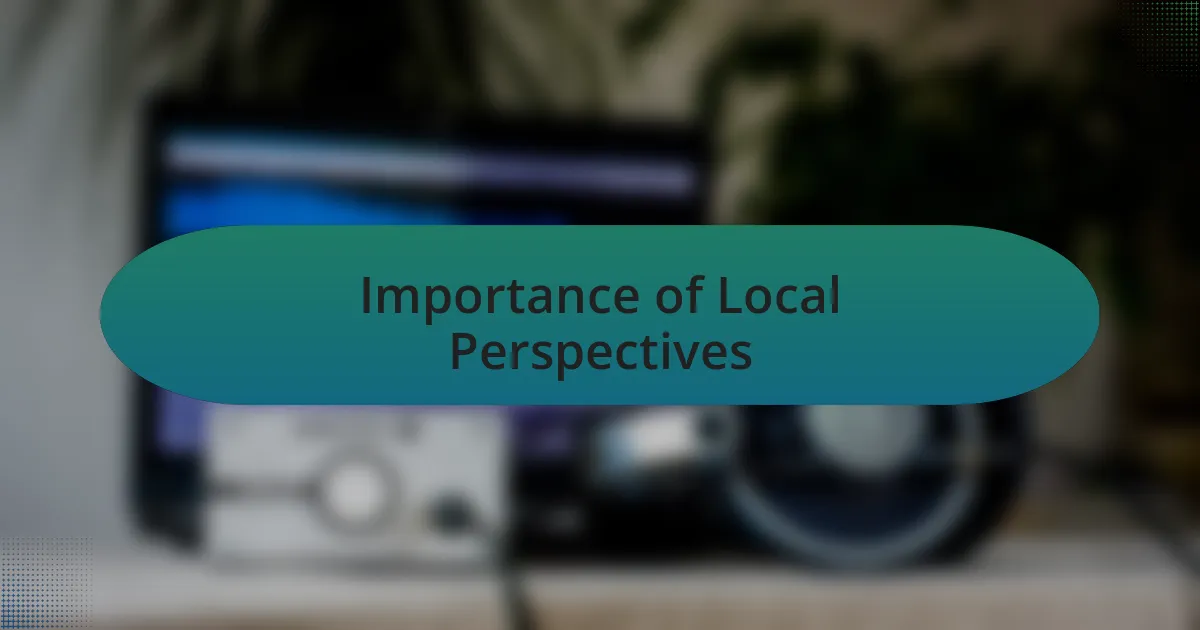
Importance of Local Perspectives
Understanding local perspectives is crucial as they bring a unique and nuanced view to broader issues. I recall interviewing a local artist who shared the struggles and triumphs of their community. Their story painted a vivid picture that was missing from mainstream narratives, making me realize how these voices are essential to fully grasp the intricacies of local challenges.
Local perspectives often shift our understanding of global events, revealing the human element behind statistics. For instance, I spoke with a farmer about the impact of climate change on his crops. His firsthand account offered a depth of emotion that data alone couldn’t convey. It prompted me to think about how personal stories can transform abstract concepts into relatable experiences.
Moreover, gathering insights from local voices fosters empathy and connection among diverse audiences. I remember feeling a sense of community when one local resident described their neighborhood’s resilience in the face of economic downturns. It struck me that these narratives can unite us, helping people from different backgrounds understand each other’s experiences in a way statistics simply cannot.
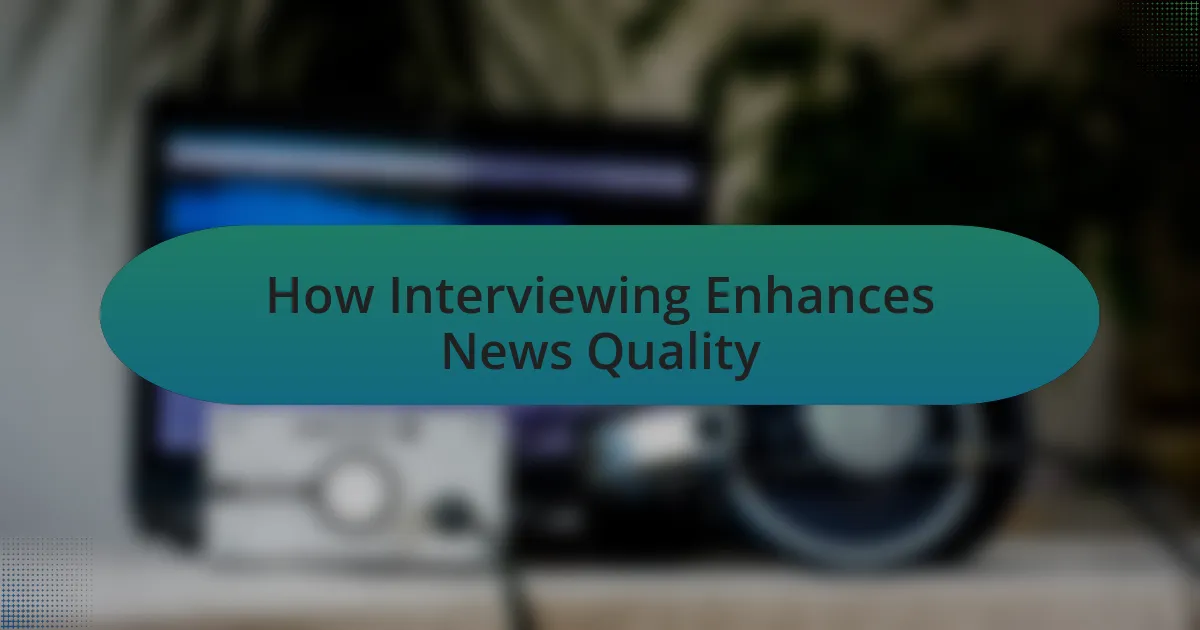
How Interviewing Enhances News Quality
Interviewing locals enriches news quality by capturing layers of detail often overlooked by traditional reporting. I recall chatting with a local shop owner whose business had been affected by recent policy changes. Hearing her emotional response to new regulations highlighted the direct impact on livelihoods, making the news feel real and urgent. This experience led me to ponder: how often do we ignore the human side of financial reports?
Interviews allow for a dynamic exchange of ideas, revealing nuances that data alone fails to communicate. I once engaged with a retired schoolteacher regarding education reforms in our area. Her stories about her students’ joys and struggles illuminated issues in the system that policy makers might miss. Isn’t it fascinating to think about how these narratives shape our understanding of broader societal shifts?
In many ways, interviewing locals serves as a powerful reminder that news is not just about facts; it’s about stories that resonate with our hearts. I’ll never forget the passion in a young activist’s voice as he spoke about his fight for environmental justice. His zeal was contagious, making me realize that these conversations can inspire action and bring an emotional depth that genuinely elevates the news landscape.
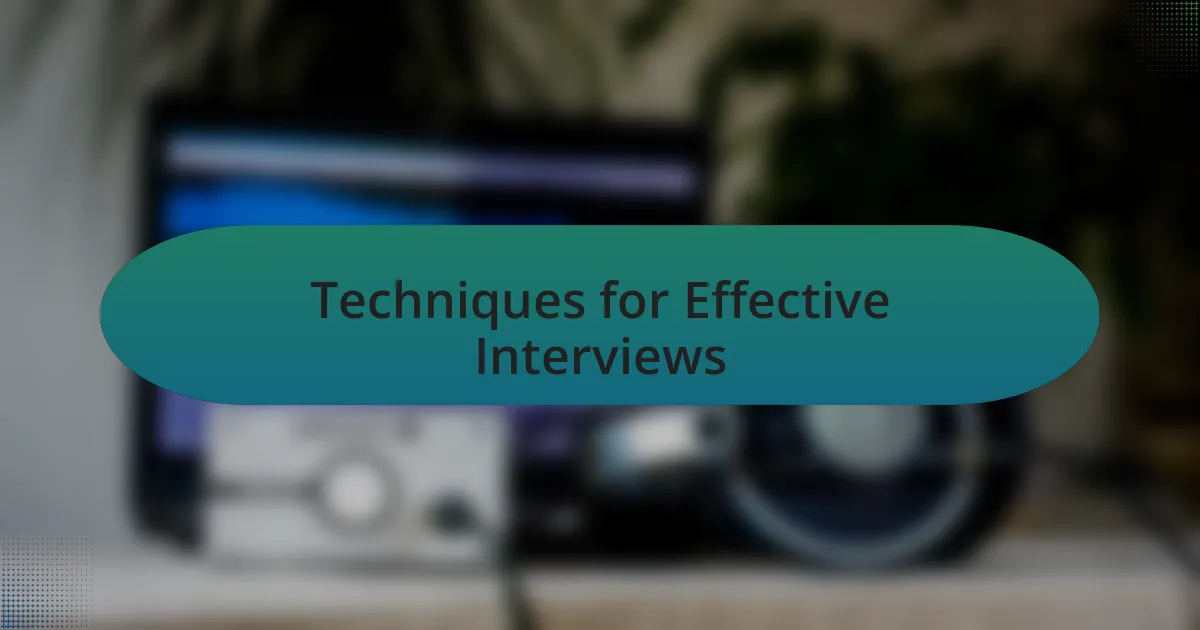
Techniques for Effective Interviews
To conduct effective interviews, one must prioritize active listening. There have been moments when I found myself so focused on my next question that I missed out on truly absorbing a respondent’s insight. I remember sitting across from a local farmer, his voice filled with passion as he shared the challenges of climate change. By pausing and allowing his words to sink in, I was able to ask follow-up questions that revealed deeper layers to his story. Isn’t it remarkable how much more you can discover when you give someone the space to express themselves?
Building rapport is another essential technique. I learned this firsthand during an interview with a community elder who had witnessed significant changes over the decades. Initially hesitant, she began to open up only after we exchanged a few personal anecdotes about our families. This connection led to a rich discussion about cultural traditions, making me think: how important is it to find common ground in our conversations?
Using open-ended questions can also significantly enhance the depth of interviews. I often reflect on a time when I asked a seemingly simple question about someone’s daily routine. Instead of receiving a straightforward answer, I was treated to an engaging narrative that encompassed not just what they did, but why it mattered to them. It made me realize that the way we frame our questions can unlock stories and insights that are otherwise hidden in plain sight.
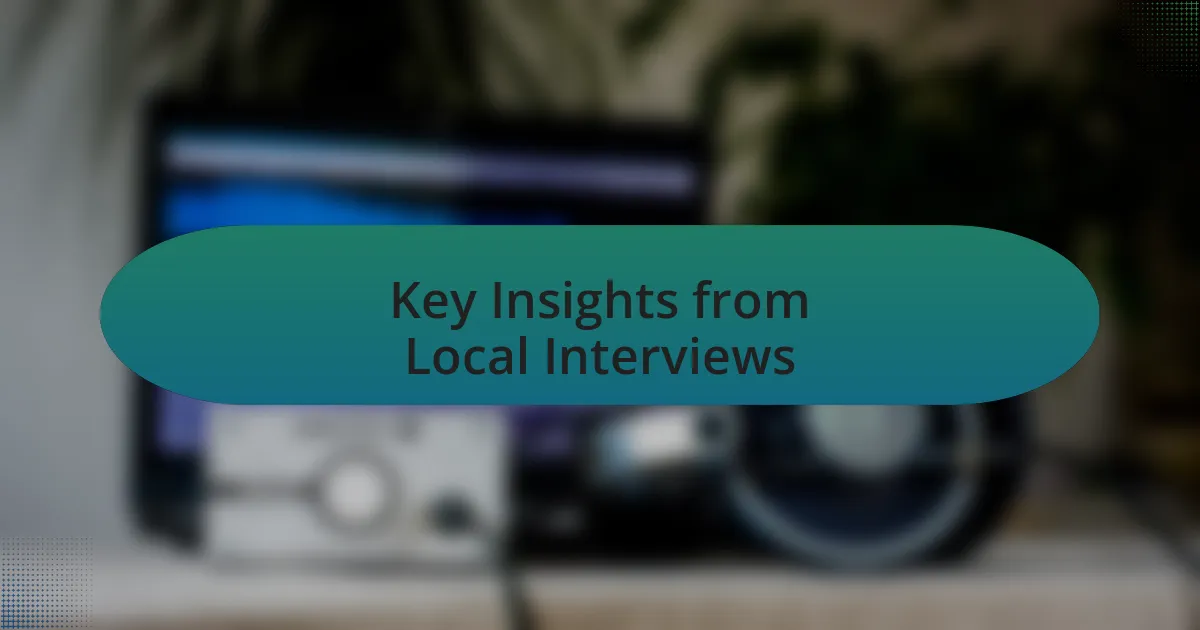
Key Insights from Local Interviews
One of the most striking insights I gathered from local interviews was the deep sense of community among residents. While speaking to a group of artisans at a local market, they shared not just their crafts but also their passion for supporting one another. I couldn’t help but feel the warmth in their voices, which led me to ponder: how does this sense of shared purpose shape their identities and contributions to the community?
Another key takeaway was the resilience many locals displayed in the face of adversity. During an interview with a small business owner who had navigated economic downturns, I was moved by her unwavering determination. She spoke candidly about the obstacles she’s faced, yet her optimism was palpable. It made me think about the stories we often overlook—how many people quietly inspire us every day through their perseverance?
Lastly, I found that local history is often intertwined with personal narratives, creating a rich tapestry of experiences. I remember interviewing an older gentleman who recounted tales of his childhood amidst the backdrop of significant local events. His vivid storytelling captivated me, transforming historical facts into living memories. Isn’t it fascinating how history becomes more relatable when we hear it through the eyes of those who lived it?
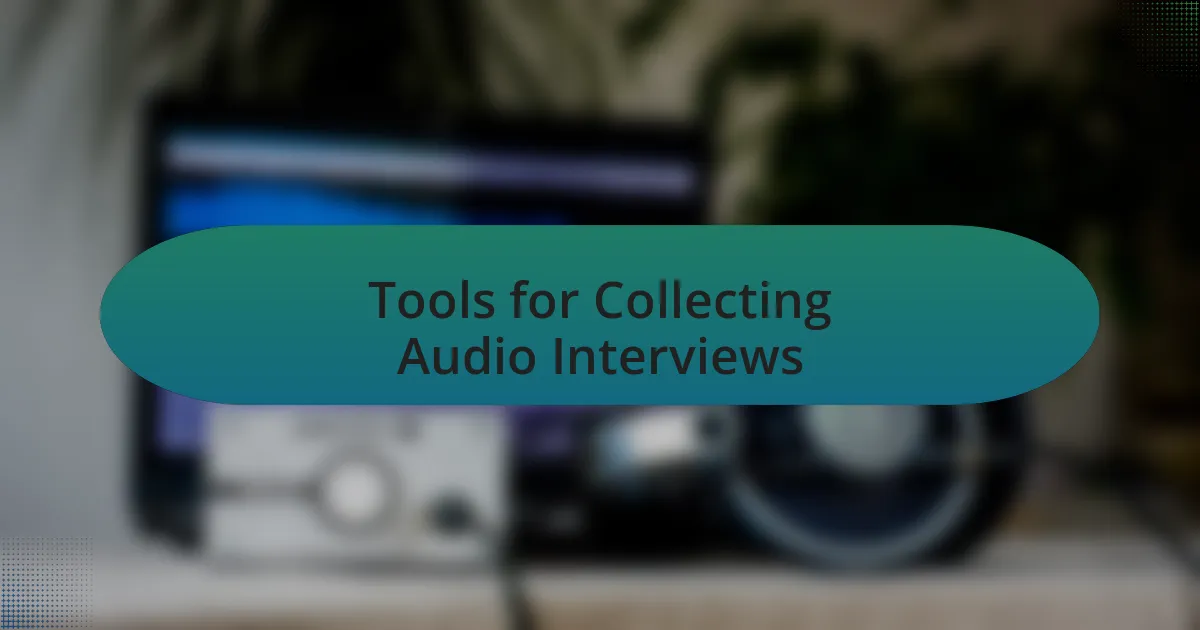
Tools for Collecting Audio Interviews
When collecting audio interviews, having the right tools can make all the difference. Personally, I’ve found handheld digital recorders to be incredibly reliable. They have excellent sound quality, and you can easily carry them without drawing much attention, which is key for an authentic conversation. Have you ever tried using one in a crowded market? The clarity of the recording helps capture those authentic moments, allowing the emotions and nuances of the interview to shine through.
Another essential tool in my experience is audio editing software. Programs like Audacity or GarageBand are invaluable for refining the audio afterward. I remember one interview where background noise threatened to drown out the interviewee’s voice. I was able to isolate her perspective and remove the distractions—transforming what could have been a lost gem into a clear and compelling story. Isn’t it satisfying to rescue a remarkable insight from the chaos around it?
Lastly, do not underestimate the power of a good set of headphones. I prefer closed-back headphones because they block out distractions and help me focus entirely on the nuances of the conversation. During an interview, slipping on those headphones can create a barrier between the noise of the outside world and the important stories being shared. I often wonder how much more I’d miss without them, as they allow me to really tune into the emotion and depth of the speaker’s voice.
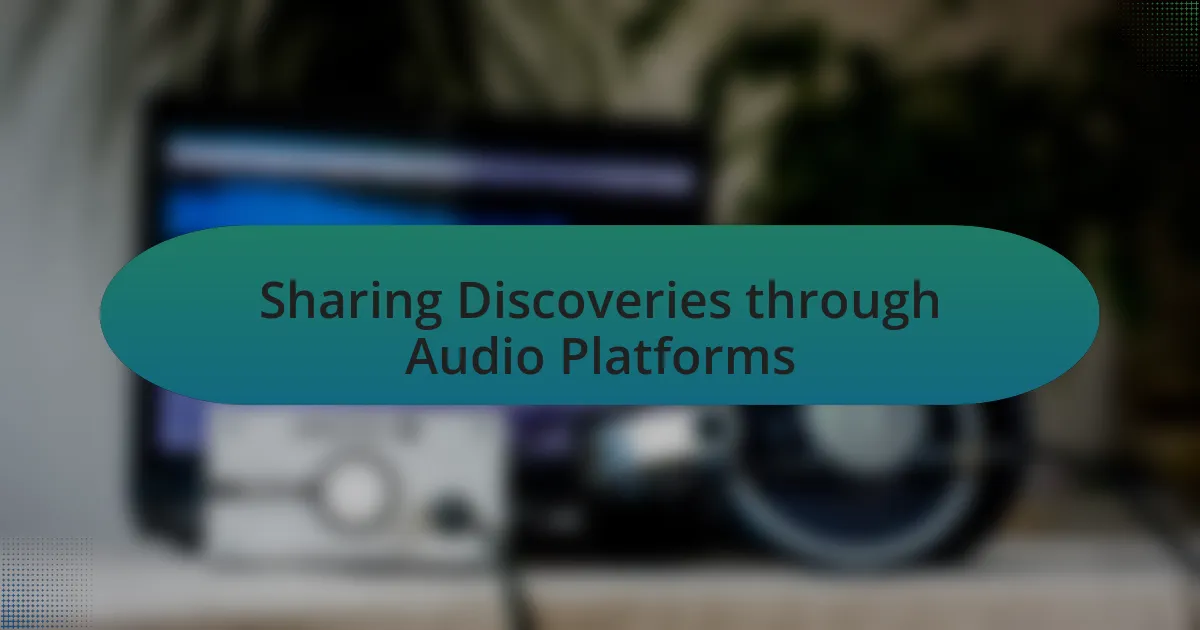
Sharing Discoveries through Audio Platforms
Sharing discoveries through audio platforms has become an enriching way to connect with audiences. I remember launching a podcast series after a series of local interviews. The instant feedback from listeners, expressing their emotions as they related to the stories shared, was astonishing. Isn’t it incredible how a voice can transport someone right into a moment, bridging distances with mere words?
Audio platforms allow for a dynamic exploration of narratives that written articles just can’t capture. When I first posted an episode about a local artisan’s journey, the richness of her life story unfolded in ways I never expected. Hearing her laughter and pauses gave listeners an intimate look into her experiences and dreams. It felt like I was sharing a personal conversation rather than just information.
The conversations I’ve recorded often reveal surprising insights about the community, emphasizing the profound effect of sharing through sound. One memorable exchange was with an elderly gentleman who narrated his childhood experiences. Listening back, I realized how his voice carried layers of history and emotion often lost in print. Don’t you think that actively engaging with these voices creates a deeper understanding of our shared humanity?